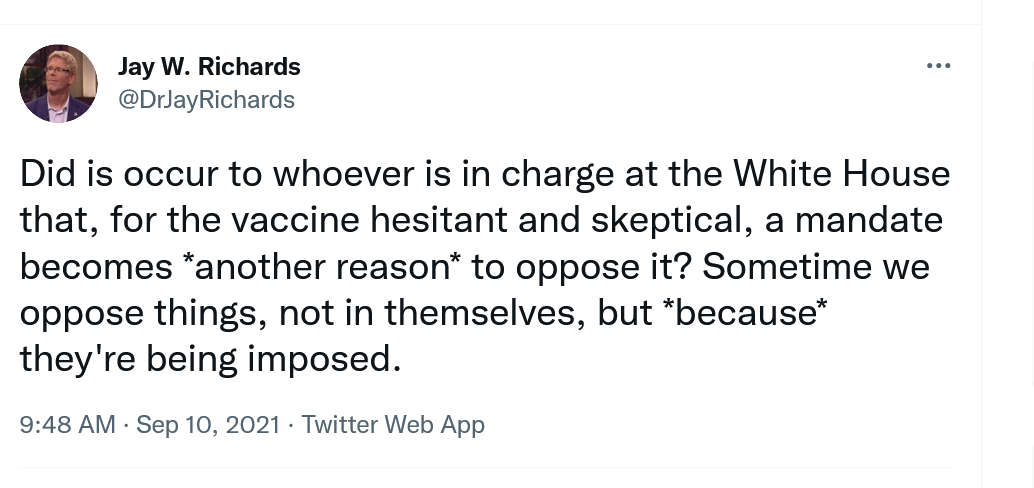
I have seen a lot of people talking about how the Biden vaccine order will backfire, resulting in fewer people getting vaccinated. Specifically, they claim it will turn those who are hesitant into staunch opponents. Let's talk about why these claims don't make a lot of sense.... 







Assuming people make decisions based on costs and benefits, requiring either vaccines or regular testing for many jobs will increase the costs associated with remaining unvaccinated. So if you believe people are rational actors, then this will lead to more vaccinations.
Of course, most people often act irrationally. So it’s understandable to think that not everyone will make the simple cost benefit analysis and get a vaccine.
But that doesn’t necessarily mean that requiring something will make it more objectionable.
But that doesn’t necessarily mean that requiring something will make it more objectionable.
We talk about this in criminal law a lot because we care a lot about what will make people act certain ways.
And the evidence seems to show that merely changing the law will have some impact on people’s behavior.
But there’s a limit to that law-->behavior relationship.
And the evidence seems to show that merely changing the law will have some impact on people’s behavior.
But there’s a limit to that law-->behavior relationship.
Specifically, the change in the law needs to have an outcome that is close enough to people’s preexisting preferences to change their behavior.
If it’s a radical change from those preferences, then people won’t follow the law & may lose respect for it.
If it’s a radical change from those preferences, then people won’t follow the law & may lose respect for it.
Dan Kahan presents a model for this phenomenon and gathers a bunch of real world examples in his 2000 article on sticky norms and law enforcement, “Gentle Nudges vs. Hard Shoves” chicagounbound.uchicago.edu/uclrev/vol67/i…
So what does this tell us about the vaccine hesitant?
Assuming that the same patterns hold true, we should expect to see those people who weren’t all that hesitant about getting a vaccine deciding to get their shot.
And those who really, really didn’t want a vaccine to refuse.
Assuming that the same patterns hold true, we should expect to see those people who weren’t all that hesitant about getting a vaccine deciding to get their shot.
And those who really, really didn’t want a vaccine to refuse.
What does that tell us about those claiming that Biden’s decision will result in more vaccine objectors?
It doesn’t look good for them because the only people who would move from “hesitant” to “objecting” are the folks who probably never would have gotten a shot on their own.
It doesn’t look good for them because the only people who would move from “hesitant” to “objecting” are the folks who probably never would have gotten a shot on their own.
Of course, it is far from clear that the patterns from criminal law compliance will necessarily translate to vaccines.
It’s *possible* that a different dynamic would take hold, and people who might have gotten the vaccine eventually now refuse, leading to fewer vaccinated people.
It’s *possible* that a different dynamic would take hold, and people who might have gotten the vaccine eventually now refuse, leading to fewer vaccinated people.
But that seems really unlikely.
In fact, we have a lot of real world examples of folks rushing to get the vaccine once the costs of not being vaccinated got too high.
Here’s what happened in France when vaccines became mandatory to eat in restaurants and do other fun things:
In fact, we have a lot of real world examples of folks rushing to get the vaccine once the costs of not being vaccinated got too high.
Here’s what happened in France when vaccines became mandatory to eat in restaurants and do other fun things:

And for those of you will inevitably show up in my mentions to say Americans, with our rugged independence, won’t react the same way as the French, here’s one example from the US.
https://twitter.com/kylegriffin1/status/1436290861336121346?s=20
Let’s be clear, I’m not a behavioral economist, so I may be missing some research suggesting that these folks are correct.
But I haven’t seen anyone actually offering that sort of research in support of their anti-Biden views. Instead they are just saying “tyranny = resistance”
But I haven’t seen anyone actually offering that sort of research in support of their anti-Biden views. Instead they are just saying “tyranny = resistance”
Perhaps they do have some empirical basis for their predictions that they haven't supplied.
But it seems more likely to me that they have fallen into a common trap---assuming that their substantive preferences are representative of what *other* people also think and will thus do.
But it seems more likely to me that they have fallen into a common trap---assuming that their substantive preferences are representative of what *other* people also think and will thus do.
I see this a lot when people insist that their favorite candidates are more “electable” than their opponents or that their favorite policies are more popular.
Sometimes they are right. But other times they seem to be making unsupported assumptions.
Sometimes they are right. But other times they seem to be making unsupported assumptions.
Don’t get me wrong: We all want to think we are right. We all want to think that our views are the most reasonable.
But when it comes to make predictions about what others will do, we should rely on more than our knee-jerk personal preferences.
But when it comes to make predictions about what others will do, we should rely on more than our knee-jerk personal preferences.
• • •
Missing some Tweet in this thread? You can try to
force a refresh







